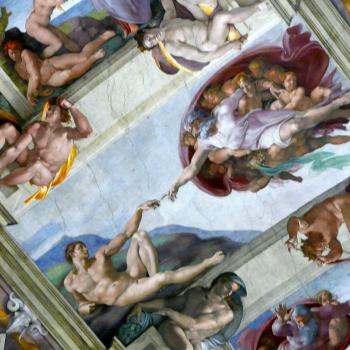As discussed in previous articles, Kabbalah speaks of two states of awareness. The "higher" state is the state of seeing the full picture. In this state, it is clear to the individual that all is from God and for the best. Therefore, one who is in this state will undoubtedly be experiencing joy since all is for an ultimately meaningful and qualitatively good purpose. We will refer to this state as Expansive Consciousness.
The "lower" state is the state of seeing the keyhole perspective. Here only part of the picture is seen. In this state, the individual has not internalized the fact that all is from God and for the best. It is only when an individual is in this "lower" state that the experience of pain or difficulty can bring on sadness and depression since it is in this state that there is uncertainty and doubt that all is for an ultimately meaningful and qualitatively good purpose. We will refer to this state as Constricted Consciousness.
When an individual is able to increase his awareness of the fact that all is for the best even though he only sees the "lower" keyhole perspective, he sweetens the difficulty he's dealing with at its root. He internalizes that the root of any difficulty we face stems from the good God, and therefore, the difficulty we face is, at its root, good. Thus, the knowledge that there's a good and purposeful essential nature that is at the root of one's difficulty sweetens the difficulty one faces since it is only purposeless suffering is completely bitter. When a person comes to view his suffering as for a greater good, it sweetens the suffering by showing it to be purposeful and valuable at its core.
Breakdown of the Day
According to Kabbalah, the day breaks down into four time periods in which each time period brings with it a particular energy and reflects a particular state of consciousness and God-awareness as paralleled by the transition of light present in that time period.
- The Midnight Period: Midnight—>Morning
- The Morning Period: Morning—>Midday
- The Midday Period: Midday—>Evening
- The Evening Period: Evening—>Midnight
We see that Period #2, the Morning, is the staple time of Expansive Consciousness. The Morning Period brings with it the clearest and most positive time for God-consciousness since it is daytime (and therefore has light, which reflects illumination and clarity) and is increasing in light from the beginning of the period until the end of the period.
On the contrary, Period #4, the Evening, is the staple time of Constrictive Consciousness. The Evening Period brings with it the least clarity and the most negative time for God-consciousness since it is night time (and therefore has darkness, which reflects ambiguity and confusion) and is decreasing in light from the beginning of the period until the end of the period.
(Thus, according to Jewish law, we are to say the Shema prayer, which is all about God's all-encompassing oneness and our consciousness of that all-encompassing oneness, in the Morning Period and the Evening Period, since it is these time periods that parallel the essential states of God-consciousness.)
The Period in between these two periods, Midday, has an aspect of both Expansive Consciousness and Constrictive Consciousness since the Midday Period brings with it light, but the light is decreasing. Thus, the Midday Period is the staple time of transition from Expansive Consciousness to Constrictive Consciousness. It is in the Midday Period that Constrictive Consciousness can be "sweetened" by Expansive Consciousness and Expansive Consciousness can "flow through" to be experienced even in Constrictive Consciousness.
This is what the Mincha Prayer, which is to be said during the Midday Period, is all about. The Mincha Prayer is to be prayed in the middle of the day when, in general, people are involved with their business dealings. Kabbalistically, business is generally associated with Constrictive Consciousness as it appears as if one's business is dependent on one's own dealings, the market, etc., rather than on God. However, by praying Mincha in the middle of the business day one infuses the Constrictive Consciousness of his business dealings with the Expansive Consciousness of the fact that his business dealings are just as dependent on God as the poor person is dependent on those who support him. Thus, the word Mincha itself literally means gift, since, despite the efforts one puts into his business dealings, the end result is a gift from God, having nothing to do with his efforts.
(Of course, this does not mean we are supposed to stop working altogether. Rather the holy schizophrenia of the Kabbalah is to be involved in the physical because we do not rely on miracles, yet to know at the same time that one's success is not determined by the efforts one puts in, but on God alone.)
Author's Note: Rabbi Eli is is scheduling a lecture tour across North America for February/March 2012. If you would like to book Rabbi Eli for a lecture, seminar, or consultation, contact [email protected].
11/2/2011 4:00:00 AM





